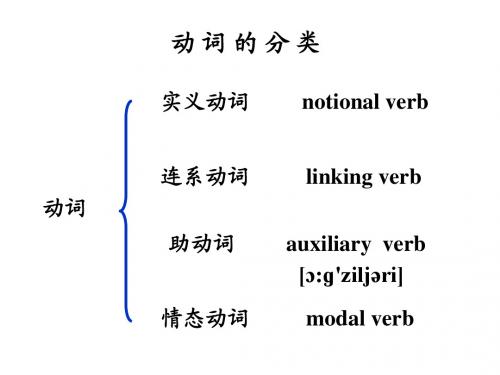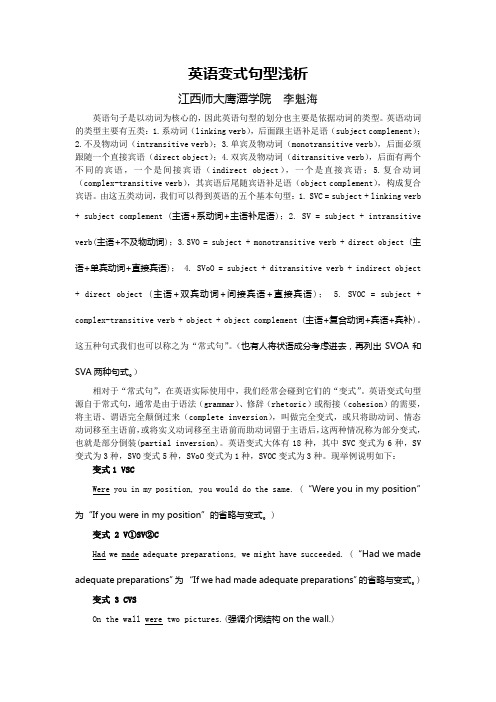linking verbs
- 格式:docx
- 大小:32.90 KB
- 文档页数:6




微型课题英语动词的分类在高中英语教学中,有很多学生不明白该如何使用be动词及其它动词,不管是写句子还是说话,一提笔或一张口就是I’m接动词原形。
经过反复强调和纠正,学生仍然是一用就错。
显然,这是由于他们中学时英语掌握得不够扎实,对很多语法现象知之甚少且未能理顺,加上头脑中储存的正确句型甚少造成的。
实际上,be动词及其组合的动词的用法看似简单,实则较为复杂且是英语学习中的重、难点所在,若掌握了动词及其运用规则,再积累一些单词和句型,英语的运用就不是那么困难了。
动词是表示动作或状态的词,在句中具有时态、语态、语气、语体等语法特征。
1.从作用来看,动词可分为助动词(primary auxiliary)和主动词(main verb)即实义动词(lexical verb)。
1.1.实义动词是指具有实际动作含义的动词。
如talk,smile,dance,work等都表示一定的动作,因此被称为实义动词。
1.2.助动词是用来辅助实义动词构成时态、语态、否定、疑问等的词。
它包括基本助动词do,be,have;情态助动词即我们平时所指的情态动词shall,should,will,would,can,could,may,might,must,dare,need,ought to,used to等约十三个词,以及半助动词have to。
2.实义动词的分类:2.1.及物动词(transitive verb)和不及物动词(intransitive verb)及物动词(vt.)后一般接人或物做宾语,比如:tell sb.sth.中tell是及物动词,sb.是它的间接宾语,sth.是直接宾语,知道了这个词的结构,我们就可以将sb.,sth.替换成具体的词,如:tell him a story,tell me a lie,tell jokes,tell sb.that…,tell sb.to do sth…那么再将短语扩展成句子也就不难了,比如My brother loves telling jokes.He told me a lie yesterday.He told me that he would lend me his bookafter he finished reading it.The secretary told me to wait for a fewminutes.不及物动词(vi.)后一般加一些介词或副词才能带宾语。

be动词系动词连缀动词LinkingVerb be动词系动词连缀动词 Linking Verbbe 原型am 第⼀⼈称单数形式is 第三⼈称单数形式are 第⼆⼈称单数和复数形式been 过去分词being 现在分词was 第⼀⼈称与第三⼈称单数过去式were 第⼆⼈称单数和复数过去式⼝诀五感 look / sound / taste / smell / feel五变 get / become / turn / go / grow三保持 keep / stay / remain⼀是 be⼀像 seem不在⼝诀的单词:appear proveappear 英[ə'pɪə],美[ə'pɪr] vi. 似乎; 出现, 显现; 表现得; 出版; 出席vi 不及物动词 intransitive verb的缩写appear : ap-,向,往,-par,出现。
par的来源:来源于拉丁语 parere 意思是“⽣产”,有同形异义词根: par 准备,相等的。
->联想单词part 部分,出现par t表⽰已经出现的,表⽰出现的⼀部分prove 英[pruːv],美[pruv] vt. 证明, 查验, 检验, 勘探, 显⽰ vi. 证明是来⾃拉丁语probare,检验,证明,测试,来⾃pro-,向前,-be,成为,是,词源同be.英语魔法师之语法俱乐部 be动词列表look 看起来是seem 似乎是appear 显得是sound 听起来是feel 摸起来是taste 尝起来是turn 转变为prove 证实为become 成为make 做为。

英语变式句型浅析江西师大鹰潭学院李魁海英语句子是以动词为核心的,因此英语句型的划分也主要是依据动词的类型。
英语动词的类型主要有五类:1.系动词(linking verb),后面跟主语补足语(subject complement);2.不及物动词(intransitive verb);3.单宾及物动词(monotransitive verb),后面必须跟随一个直接宾语(direct object);4.双宾及物动词(ditransitive verb),后面有两个不同的宾语,一个是间接宾语(indirect object),一个是直接宾语;5.复合动词(complex-transitive verb),其宾语后尾随宾语补足语(object complement),构成复合宾语。
由这五类动词,我们可以得到英语的五个基本句型:1. SVC = subject + linking verb + subject complement (主语+系动词+主语补足语);2. SV = subject + intransitive verb(主语+不及物动词);3.SVO = subject + monotransitive verb + direct object (主语+单宾动词+直接宾语); 4. SVoO = subject + ditransitive verb + indirect object + direct object (主语+双宾动词+间接宾语+直接宾语); 5. SVOC = subject + complex-transitive verb + object + object complement (主语+复合动词+宾语+宾补)。
这五种句式我们也可以称之为“常式句”。
(也有人将状语成分考虑进去,再列出SVOA和SVA 两种句式。
)相对于“常式句”,在英语实际使用中,我们经常会碰到它们的“变式”。
连系动词的分类连系动词(linking verbs),也叫连系动词动词(copulative verbs),是指后接名词、形容词、副词等补足语,起连接主语和补足语的作用的一类动词。
这些动词本身并没有明显的动作意义,而是用于说明主语的状态或属性。
基本上,连系动词相当于某些语言中的“等于号”,用于连接主语和补足语,使语句更具意义和连贯性。
以下将为大家介绍连系动词的分类。
1.实义动词作连系动词2.系动词系动词是指后面的补足语与主语之间存在着直接的联系和对应关系,它表示主语的状态、性质、特征、身份、归属等。
常见的系动词有 is, am, are, was, were, be, been, being。
例如,“The flowers are beautiful”可译为“这些花很美”。
3. 感官动词感官动词指人类的五官所能感觉到的事物,包括看、听、闻、尝、触及等,这些动词常用来表示主语的外在现象,同时可以表达“被动”或“主动”的含义。
常见的感官动词有 look, sound, feel, taste, smell。
例如,“The food tastes delicious”可译为“这种食物很好吃”。
4. 具体行动动词助动词是指后面存在实义动词或被动语态,用来构成各种时态、语态或情态的动词。
在句子中充当连系动词,连接主语和实义动词,其后面的实义动词起主要表示动作意义,补足语则仍为形容词或名词等。
助动词常见的有 be、do、have、will、shall等。
例如,“I am studying English”可译为“我正在学习英语”。
总之,不同的连系动词在使用方式和用途上具有很大的差异,学会掌握不同的连系动词的分类是英语学习的必备技能,可以帮助我们更准确明了地表达话语的意思,也有助于我们的写作、口语和阅读能力的提高。
Linking-verbBaidu系动词的主要分类:1)状态系动词用来表示主语状态,只有be一词,例如:He is a teacher. 他是一名教师。
(is与补足语一起说明主语的身份。
)2)持续系动词用来表示主语继续或保持一种状况或态度,主要有keep, rest, remain, stay, lay, stand,例如:He always kept silent at meeting. 他开会时总保持沉默。
This matter rests a mystery. 此事仍是一个谜。
3)表像系动词用来表示"看起来像"这一概念,主要有seem, appear, look, 例如:He looks tired. 他看起来很累。
He seems (to be) very sad. 他看起来很伤心。
4)感官系动词感官系动词主要有feel, smell, sound, taste, 例如:This kind of cloth feels very soft.这种布手感很软。
This flower smells very sweet.这朵花闻起来很香。
5)变化系动词这些系动词表示主语变成什么样,变化系动词主要有become, grow, turn, fall, get, go, come, run.例如:He became mad after that. 自那之后,他疯了。
She grew rich within a short time. 她没多长时间就富了。
6)终止系动词表示主语已终止动作,主要有prove, turn out, 表达"证实","变成"之意,例如:The rumor proved false. 这谣言证实有假。
The search proved difficult. 搜查证实很难。
His plan turned out a success. 他的计划终于成功了。
英⽂的七个基本句型英⽂的七个基本句型(major clause type)有⼈可能感到奇怪,不是五个基本句型吗?哪来的七个?⾸先告诉⼤家,七个基本句型不是我的独创,那是⼈家的语⾔,咱可不能闭门造车。
只是Randolph Quirk等⼈编写的,1985年出版的《英语语法⼤全》提出的理论。
英语的句⼦⽆论多复杂,其实都是由这七种句型组成的。
懂得这七个基本句型,就等于掌握了英语的钥匙。
下⾯咱们就看看都是哪七个句型。
前⼏天我写了英⽂的句⼦成分⼀⽂。
如果觉得这⾥的有些术语不懂可以先看看那篇⽂章。
⼀、主谓 S+VThe sun is shining.The rabbit disappeared.在这种句⼦⾥,有⼀个主语和⼀个谓语就可以把事情说清楚,但这样的句⼦并不多见。
⼀般都有⼀个状语。
The rabbit disappeared suddenly. 当然是否要有状语要看个⼈表达的需要。
⼆、主谓宾S+V+OI have read the book.They built the bridge.这类句⼦中,除了主谓之外,还要有⼀个宾语才能把意思表达完整。
如果我们只说,I have read。
或 they built。
那么听话的⼈⼀定会问,You have read what? They built what? 所以只有把宾语说出来才能把事情说清楚。
判断动词后⾯的词是否是宾语,只要把该词换成what,句⼦仍然通顺,就是宾语,否则不是。
如:He saw a film.(他看了⼀部电影)我们可以说He saw what?(他看了什么?)但是He went to the theatre.(他去戏院了)我们就不可以说He went what?(他去了什么?)我们可以说He went where?(他去哪⼉了)这种结构中动词后的成分是状语。
可⽤what, who, which, whom代替的成分⼀般为宾语或表语。
可⽤how, when, where, why 代替的成分为状语。
系动词+ adj. ,实义动词+ adv.1.类别1)be动词2)保持:keep, stay3)感官:feel感到;摸起来,look看起来,taste尝起来,smell闻起来,sound听起来4)表象:seem/ appear 似乎5)变化:become/grow/turn/get/make2.系动词+adj,adj修饰主语;实义动词+adv,adv修饰动词。
3.系动词后面跟to do。
4.没有时间状语时,系动词用一般现在时。
5.注意look这个词:当look做系动词时,后跟adj:She looks beautiful.当look做实义动词时,通常以词组look at的形式出现,后跟adv。
She looked carefully at the paper.填空(在题号前写空格里面的是adj还是adv,括号里面的全部是形容词)1.Please keep ____________.(quiet)2.Everyone should stay ____________(calm) when there is an emergency.(紧急情况)3.I don’t feel ___________(good) today, so I don’t want to go to school.4.The music sounds _____________.(beautiful)5.The dancers dance ____________(good) in the performance(表演).6.The fish tastes __________(good), the cake smells __________(good), and the cake smells _________.(good)7.He becomes very _____________(careful) after that accident.8.The sofa feels ____________.(soft)9.Your idea sounds ____________.(great)10.The children are ____________(fly) kites _____________.(happy)11.The singer sings _____________(beautiful).12.The small tree grows ____________.(fast)13.My father is growing ____________(old) day by day.14.He grows much ____________(tall) than ever before.15.I turned off the TV ____________(quiet) in order not to wake up my mother.16.The leaves turn ____________(yellow) when autumn comes.17.I got up ____________(early) in order to catch the bus.18.The teacher got ____________(angry) when the boy was talking in class.19.Jenny was making a cake ______________(careful) when I came in.20.The boy made his father ____________(angry) because he smoked.21.I looked _____________(careless) at the paper, so I made some mistakes.22.You look _____________(beautiful) in red.23.Harry is older than I. But he _______ younger than I.A. lookB. looksC. lookedD. looking24.It _______ like the singing of the birds.A. soundsB. looksC. smellsD. tastes25.This kind of cake tastes _______.A. goodB. wellC. to be goodD. to be well26.This math problem is _______ and I can do it _______.A. easy, easilyB. easily, easilyC. easy, easyD. easily, easy27.Coffee is ready. How nice it _______! Would you like some?A. looksB. smellsC. soundsD. feels28.The ______ boy was taken to the nearest hospital.A. illB. sickC. goodD. clever29.He has not been at school, because he is ______.A. illB. wellC. fineD. nice30.I this book is very good. It ______ buying.A. worthsB. is worthC. worthD. is worthing31.The film is very interesting. It is worth ______ a second time.A. seeingB. seeC. to seeD. seen32.I have worked on the problem, so I am feeling tired and ______.A. asleepB. sleepyC. sleepingD. sleep33.He lay on the floor and fell ______.A. sleepyB. sleepingC. awakeD. asleep34.Who is ______ in the next room?A. asleepB. sleepC. sleepingD. sleepy35.We have ______ time to do it better.A. notB. noC. no aD. not a36.We have ______ water to wash clothes.A. not anyB. noC. not aD. no any37.That's really silly ______.A. of you to say soB. for you to say soC. of you saying soD. for you saying so38.It's important ______ exercise every morning.A. of you to takeB. for you to takeC. of you takingD. for you39.The children all looked _______ at the broken model plane and felt quite _______.A. sad, sadB. sadly, sadlyC. sad, sadlyD. sadly, sad40.You must drive ______ next time, or there may be another accident.A. more carefullyB. carefullyC. carefulD. more careful41.His father is ______ than his mother.A. older four yearsB. as four years olderC. four years olderD. bigger four years42.Tom is stronger than ______ in his class.A. any other boyB. any boysC. any boyD. other boy43.When spring comes, it gets ______.A. warm and warmB. colder and colderC. warmer and warmerD. shorter and shorter44.By and by, ______ students in our class came to like English.A. more and moreB. much and muchC. many and manyD. less and least45.At last he began to cry ______.A. hard and hardB. more hard and more hardC. harder and harderD. less hard and less harder46.When spring comes the days get ______ and nights get ______.A. short, longB. long, shortC. longer, shorterD. shorter, longer47.______ I look at the picture, ______ I like it.A. The best, he moreB. The more, the lessC. The more, lessD. more, the more48.______ he read the book, ______ he got in it.A. The more, the more interestingB. The less, the more interestingC. The more, the more interestedD. more, more interested49.The tree is ______ in the garden.A. the tallerB. the tallestC. taller than of allD. tall.50.This kind of paper _______ nice.A. feelB. feltC. is feelingD. feels51.Mary studies harder______ in her class.A. as any oneB. than any other girlC. than the otherD. than anyone52.Which is ______, Li lei or Wu tong?A. strongB. strongestC. strongerD. the strongest53.Which language is ______, English, French or Japanese?A. easyB. the most easyC. the easiestD. much more easy54.Which is ______ interesting, science, math or English?A. moreB. the mostC. veryD. too55.Which city is ______, Beijing, Shanghai or Fuzhou?A. beautifulB. more beautifulC. much more beautifulD. the most beautiful56.Which month is ______, June, July or August?A. hotB. hotterC. hottestD. the hottest57.Do you have ______ to tell us?A. something newB. new somethingC. anything newD. new anything58.Mike, I have ______ to tell you.A. important somethingB. important anythingC. something importantD. anything important59.The house is ______ small for a family of six.A. much tooB. too muchC. very muchD. so60.---What's your brother like? ---He is ______.A. a driverB. very tallC. my friendD. at school61.Our classroom is ______ larger than theirs.A. moreB. quiteC. veryD. much62.Of the two cups, he bought ______.A. the smallerB. the smallestC. smallD. smaller63.Which do you think tastes ______, the chicken or the fish?A. goodB. betterC. bestD. well64.This work is ______ for me than for you.A. difficultB. most difficultC. much difficultD. more difficult65.Beijing is one of____ in china.A. the largest cityB. the large citiesC. the larger citiesD. the largest cities66.---The cake looks ______. ---Yes, and it tastes even ______.A. well, goodB. nice, betterC. good, worseD. better, best67.Math is more popular than ______.A. any other subjectB. all the subjectsC. any subjectD. other subject68.He got _______ when he heard the bad news.A. angryB. angrilyC. happyD. happily69.Miss White is as _____ as Miss Brown, but she looks much ______ than Miss Brown.A. old, youngerB. old, youngC. older, youngD. younger, old70.---The teacher looked at her students ____ when they were saved.---We also felt ____ for themA. happily, happyB. happy, happilyC. happy, happyD. happily, happily71.Tina said that she didn’t feel very _____ this morning.A. wellB. goodC. niceD. better72.I can’t eat more food. I am _______.A. busyB. hungryC. fullD. serious73.Harriet is lost and her parents are really ______ her.A. interested inB. afraid ofC. busy withD. worried about74.Sometimes walking is even _____ than driving during the busy traffic time.A. fastB. fasterC. slowD. slower75.Of the two T-shirts, I would choose the ______ one to save some money for a book.A. cheapestB. cheaperC. more expensiveD. most expensive76.---How was your weekend? ---It was ______. I had lots of fun.A. terribleB. tiringC. badD. wonderful77.There is ______ in today's newspaper.A. interesting somethingB. nothing interestingC. interesting anythingD. anything interesting78.-Is Mrs. Brown badly ill?-No, ______. Only a little cold.A. quite wellB. nothing seriousC. not worryD. anything seriouse here, I have______ to tell you.A. interesting somethingB. anything interestingC. nothing interestingD. something interesting80.I'm not ______ to lift the heavy box.A. short enoughB. enough tallC. health enoughD. strong enough81.The girl works hard ______ to pass the exam.A. enoughB. tooC. stillD. yet82.Do you want______A. else(其它的) anythingB. anything elseC. other anythingD. else something83.Have you seen ______ in the room?A. anyone elseB. else anyoneC. anyone otherD. everyone else84.She was sick yesterday, but she is______ to go to school today.A. enough goodB. good enoughC. enough wellD. well enough85.This kind of book is______ for the children to read.A. enough wellB. enough goodC. well enoughD. good enough86.This book is ______ i'd like to read once more.A. such an interesting, thatB. so interesting, thatC. such an interesting, asD. a so interesting, as87.I think the book is very ______.A. interestingB. interestedC. interestD. interests88.They were very ______ to see each other again.A. pleasedB. surprisingC. happilyD. angrily89.She is very______ the news.A. surprise inB. surprise withC. surprised atD. surprised for90.The boys are ______ computers.A. interesting inB. interested inC. interesting aboutD. interested about91.______ helped a lot in our country.A. The blind isB. The blind areC. The blinds isD. Blind are92.______ should study hard for their work.A. YoungB. The young manC. The youngD. The young girl93.______ a happy life in china.A. The old man liveB. The old liveC. The old is livingD. Old live94.I don't feel very ______.A. terriblyB. wellC. goodD. badly95.Jim does morning exercises every day, so he looks very ______.A. tiredB. goodC. wellD. happy96.China is larger than ______ in Africa.A. any other countryB. other countriesC. the other countryD. any country97.The man was not ______ when he heard the ______ words.A. frightening; frighteningB. frightened; frightenedC. frightening; frightenedD. frightened; frightening98.Li Hua studies English very _____ and her English is _____ in her class.A. careful, goodB. carefully, wellC. careful, bestD. carefully, the best99.If you don’t work ______ enough, I don’t think your dream will come _______.A. hardly, trulyB. hardly, trueC. hard, trueD. hard, truly100.Please read every sentence _______. The more _______ you are, the fewer mistakes you’ll make.A. carefully, carefulB. careful, carefulC. careful, carefully101.Is this a photo of your daughter? She looks ______ in the pink dress!A. lovelyB. quietlyC. politelyD. happily102.The Internet is very useful for us. We can ______ find information.A. easyB. easilyC. hardD. hardly103.Though his grandmother lives ______, she never feels ______.A. alone, aloneB. lonely, lonelyC. alone, lonelyD. lonely, alone104.We arrived _____ late that there were no seats left.A. muchB. tooC. soD. very1.quiet2.clam3.well4.beautiful5.well6.good, good, good7.careful8.soft9.great10.flying, happily11.beautifully12.fast13.older14.taller15.quietly16.yellow17.early18.angry19.carefully20.angry21.carelessly22.beautiful23. B24. A25. A26. A 27. B28. B29. A30. A31. A32. B33. D34. C35. B36. B37. A38. B39. D40. A41. C42. A43. C44. A45. C46. C47. B48. C49. B50. D51. B52. C53. C54. B55. D56. D57. C58. C59. A60. B61. D62. A63. B64. D65. D66. B67. A68. A69. A70. A71. A72. C73. D74. B75. B76. D77. B78. B79. D80. D81. A82. B83. A84. D85. D86. B87. A88. A89. C90. B91. B92. C93. B94. B95. C96. A97. D98. D99. C100.A101.A102.B103.C104.C。